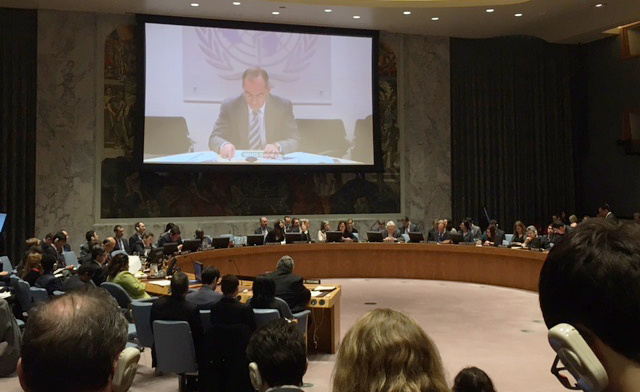On 26 January 2017, Dr. Peter Salama, Executive Director of WHO’s Health Emergencies Programme, joined Mr. Stephen O’Brien, UN Under-Secretary-General and Emergency Relief Coordinator, and Mr. Amir Mahmoud Abdulla, Deputy Executive Director of the World Food Program, to brief the UN Security Council on the on-going challenges and UN system-wide efforts to provide protection, food, and medical supplies and care in Syria.

Peter Salama, WHO, at the UN Security Council briefing on Syria
Dr. Salama, connected via video link, highlighted the devastating impact the war has had not only on civilians but also on the Syrian health system – both in terms of human resources and infrastructure – noting that almost two thirds of health care workers have fled the country and that more than 100 attacks on hospitals have occurred in 2016. He emphasized the extent of the indirect toll of the war on civilian lives, particularly in regard to the substantial amount of children missing immunizations and at risk of developing mental health disorders, as well as pregnant women unable to access urgent care. Despite the challenges on the ground, WHO and its UN and NGO partners have found innovative means of service delivery and, with the support of the remaining Syrian health care workers, have been able to vaccinate 2.5 million children, deliver more than 10 million treatments and train 16,000 health care workers, as well as provide assistance in medical evacuations. WHO stands ready to scale-up programmes and provide medical supplies, given a logistic system is put in place to deliver them. Dr. Salama concluded with four requests to the Security Council to ensure the evacuation of critically ill patients, sustained and unconditional access for medical teams in all areas of Syria and essential health supplies into hard to reach and besieged areas, as well as an end to attacks on health care workers and ensuring that perpetrators are held accountable.
Under-Secretary-General O’Brien referred to the overwhelming levels of devastation seen in 2016 as a “complete meltdown of humanity,” stressing that only a political solution will be effective and calling for a consolidation and extension of the current ceasefire. He highlighted, with utmost concern, the diminishing access and administrative delays which have been crippling the UN and relief agencies’ abilities to provide assistance on the ground and called on council members to do more to ensure the support of the Syrian government to deliver life-saving assistance through existing structures and mechanisms. Despite the obstacles faced, Mr. O’Brien recognized the reach of the UN system’s response, which has accounted for nearly 90 per cent of the supplies distributed. Last week 19 million USD was released from the OCHA-managed Syria Humanitarian Fund to support immediate life-saving and early recovery assistance and the UN maintains its capacity to respond to hundreds of thousands of people, should access be granted.
Mr. Abdulla, WFP stressed that the situation remains grave – four out of five people are living in poverty and half of the current population is in need of food, agriculture and livelihood assistance – that is, 7 million people who are food insecure and an additional 2 million at risk. Further, food production has hit a record low, food prices have increased by up to 43% in hard to reach and besieged areas, fuel and land are in short supply, and agriculture infrastructure has been damaged in the conflict – all of which threatens to render Syria a nation of subsistence farming. Mr. Abdulla highlighted a high altitude parachute drop, an inter-agency operation, which although having been successful in delivering aid, has been suspended as of January 15 due to deteriorating conditions.
Following the briefings, Uruguay and Bolivia both made brief remarks to express concern for the humanitarian situation in Syria.
